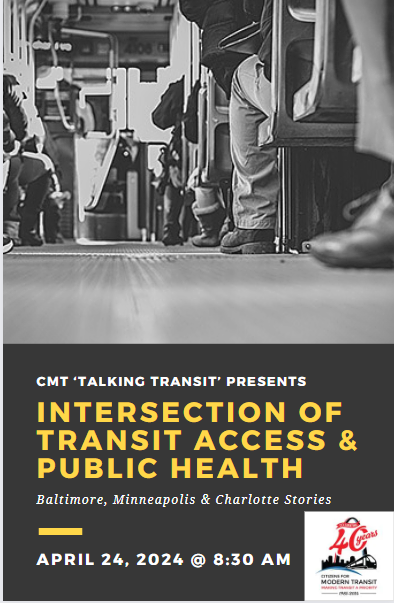Citizens for Modern Transit (CMT) has announced plans for its next virtual “Talking Transit” event, which is set for Wednesday, April 24, at 8:30 am (central) via Zoom. This event will highlight the intersection between public health and access to transit, while pointing to case studies from Baltimore, Minneapolis and Charlotte. Pre-registration is required and can be completed online here.
The panel will feature transportation advocates and professionals, along with public health and urban planning researchers. This includes Megan Latshaw, Associate Teaching Professor at Johns Hopkins Bloomberg School of Public Health; Samuel Jordan, President of the Baltimore Transit Equity Coalition; Laura Barrie Smith, Senior Research Associate at the Urban Institute, and Jason Lawrence, Chief Transit Planning Officer at Charlotte Area Transit Systems. The discussion will be moderated by Kimberly Cella, executive director of CMT.
“Research shows access to reliable transportation is vital for public health,” noted Cella “Via the proposed light rail expansion project, known as the Green Line, the St. Louis region has the opportunity to improve health impacts through better accessibility to healthcare, healthy food, education and jobs. Learn more about this reality by joining us for the online event.”
CMT hosts quarterly “Talking Transit” events to keep members, transit riders and advocates, stakeholders, elected officials and others in the loop on issues and efforts influencing the region’s transit system. These educational gatherings feature expert guest speakers and panel discussions addressing a wide range of topics, including transit access, safety & security, transit-oriented development, best practices, service changes and more. Visit CMT’s YouTube channel to explore previous “Talking Transit” events.
Related reading:
- Unreliable Mass Transit and American Public Health – Johns Hopkins University HUB
- CDC Report: Lack of Reliable Transportation for Daily Living Among Adults – NCHS Data Brief
- More than One in Five Adults with Limited Public Transit Access Forgo Health Care Because of Transportation Barriers – Urban Institute
